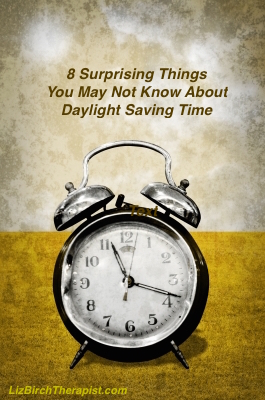2. On a positive note, depression rates fall. Researchers from Quebec, Canada say sleeping late increases REM sleep, and excessive REM sleep is linked to depression. They reviewed two studies on depression and sunrise time in cities, and found it was “significantly correlated” with depression rates — later sunrise (corresponding to earlier rising times) was associated with less depression. 3. A study in the Journal of Periodontology suggests that a chance to enjoy extra daylight can extend the life and health of our teeth and bones. That’s because our bodies get vitamin D through sun exposure. Vitamin D, along with calcium, is essential for preventing bone and teeth disorders. 4. Daylight saving time was first realized on a grand scale during World War I. It started in Germany, then caught on in a number of nations that wanted to reduce lighting demand and save coal for the war effort. During WWII, the U.S. observed year-round DST for the same reasons. 5. Research shows that given an extra hour of evening daylight, many Americans use the time to go out and do things rather than watch the television shows they'd normally view at that time. Nielsen ratings during the hours impacted by the change show large declines during the first week of DST—as much as 10 to 15 percent, even for popular shows. 6. Thieves tend to do their dirty work under the cover of darkness. So creating an extra hour of evening light helps people get home during daylight hours, which appears to drop crime rates dramatically. During the extra hour of evening daylight, robberies decreased by 40 percent, according to data from the National Incident-Based Reporting System. Murder and rape rates also went down, though it's hard to say how much because the exact time such crimes are committed is often unknown. 7. Farmers have long been labeled as big backers of daylight saving time, or even credited with getting the practice going. Whether this idea came from farmers' early rising habits or some other reason, it's a myth."From the very beginning, when DST was proposed in Britain's Parliament in 1908, until today, farmers have been the number one group against daylight saving time," said Prerau - author of the book Seize the Daylight: The Curious and Contentious Story of Daylight Saving Time. Traditionally, farmers have set their schedule by the sun, and that's mostly still the case. But when the rest of society shifts an hour of light out of the morning hours, farmers have less daylight to handle morning tasks like getting their wares to market. Those charged with handling livestock like dairy cows say it's difficult for the clock-averse animals to adjust. 8. Each U.S. state and territory is free to ignore daylight savings time, so residents of Arizona (except those on the Navajo Nation), Hawaii, Puerto Rico, the Virgin Islands, and other territories won't move their clocks this weekend. If these exceptions seem confusing, the situation was far worse 50 years ago, according to Tufts University professor Michael Downing, author of Spring Forward: The Annual Madness of Daylight Saving Time. Before the U.S. Uniform Time Act of 1966, DST was often observed very locally—and chaos was the result."In 1965 there were 130 cities in the country with populations of 100,000 or more," Downing explained. "Fifty-nine did not observe daylight saving. "Of the 71 that did, there were at least 20 different adoption dates. In Minnesota, St. Paul was on one time, Minneapolis was on a different time, and Duluth was on Wisconsin time. In fact, somebody even found a Minneapolis office building in which the different floors of the building were observing different time zones because they were the offices of different counties." Let’s all enjoy our weekend while we change our clocks at the loss of one hour. May you all embrace the well lit evening and take deep cleansing breaths when you have to wake up in the darkness. I am a licensed Marriage & Family Therapist who can provide services with anyone who resides in the State of California. I have also been trained in Clinical Hypnotherapy which is beneficial for more specific goals. Liz Birch, LMFT, CHt ~ 714-584-6047 ~ [email protected] Collingwood, J. (2007). Daylight Savings Time and Mental Health. Psych Central. Retrieved on March 7, 2015, from http://psychcentral.com/lib/daylight-savings-time-and-mental-health/000921 Handwerk, B. (2014). Daylight Savings Time: 7 Surprising Things You May Not Know. National Geographic News Photo: freedigitalphotos
2 Comments
|
|


 RSS Feed
RSS Feed